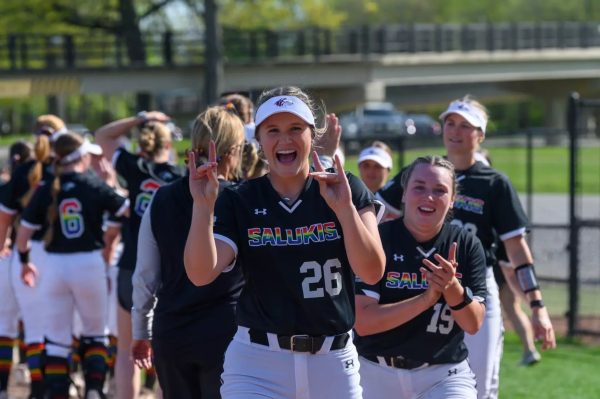SIU-C is implementing a “restorative justice” process to address long standing racial disparity in punishment
The Student Rights and Responsibilities (SRR) office at Southern Illinois University at Carbondale (SIU-C), which reviews student conduct violations at Southern Illinois University, developed a new process for handling minor infractions which administrators hope will reduce the racial disparity in administrative action reports.
In previous years, Black students at SIU-C received 39.6 percent of all disciplinary actions from Jan. 2015 to Jan. 2021, though Black students only made up 13 to 15 percent of the student population, according to university records obtained in a Freedom of Information Act Request.
White students, who made up 62.7 to 64.6 percent of the student population, accounted for 39.8 percent of disciplinary actions.
Advertisement
Brian Beccue, assistant dean of students at SRR, said this “restorative justice conversation” is intended to provide an informal path for handling code of conduct violations, such as noise violations, underage alcohol consumption or cannabis use, that would previously be formally added to students’ permanent records.
“We’d be looking at doing more of a conversation with the hall director about the alleged student’s impact to the community,” Beccue said. “And that wouldn’t be part of their student conduct record.”
While other groups restorative justice frameworks involve addressing or repairing damage in past incidents, Beccue said the new SRR procedure is only applied to cases from the Fall 2021 term forward.
The process is similar to one implemented at the University of Illinois at Urbana-Champaign, Beccue said.
Justin Brown, associate dean of students at University of Illinois Urbana-Champaign, said there, cannabis offences are treated similarly to incidents of underage possession of alcohol, which are typically processed through an informal resolution process before disciplinary action is taken.
“I think our procedures give us a lot of leeway to correct their behavior before facing formal disciplinary actions,” Brown said. “There is a workshop called challenging alcohol attitudes positively workshop we refer students to, and then for marijuana there is a marijuana information class.”
Brown said the UIUC administration does look at data for race and ethnicity to make sure there are no patterns or issues with harsher punishments being passed on because of race.
Advertisement*
Although UIUC allows student and faculty input in policies, it does not get rid of all possibilities of discirmination on campus to African American students, Brown said.
“I certainly have talked to African American, Latinx and other students who have reported discriminatory treatment at various points in their time at the university and in town and in regard to police and with security at local establishments,” Brown said.
In a November 2019 story, the Daily Egyptian reported twice as many Black students at SIU-C had been referred for cannabis offences in 2017. In 2018, 77 Black students were reported to SRR compared to 29 White students.
In a December 2019 story, Ben Ruddell, criminal justice policy director at the ACLU of Illinois, said it was disturbing but not surprising that students of color were bearing the brunt of enforcement of marijuana infractions on campus.
“Although people of different races use marijuana and other drugs at similar rates, there is a long and ongoing history of disproportionate enforcement of drug laws against Black and Brown people,” Ruddell said.
John Dunn, SIU-C’s interim vice chancellor at the time, said in 2019 a working group was appointed to, “take a deeper dive into the data to understand the drivers, since referrals come from multiple sources, and we need to fully understand the correlations.”
A report from the working group, which Beccue said was lead by Lori Stettler, the vice chancellor of student affairs at the time, was not available at the time this article was published.
Aujalee Gordon, a former SIU-C student, said she was involved in multiple incidents where campus police were called to investigate a cannabis infraction.
Gordon said she was ticketed after her roommate reported her to a Resident Assistant (RA) for smoking in the dorm room. The RA in turn brought in campus police. Gordon said the lead officer was a Black man, and she felt he must have empathized with her.
“He just had seen pictures of my mom on the wall, basically knowing she is a single mother, started telling me don’t disappoint your mother,” Gordon said. “After that I never smoked on campus ever again.”
After the incident, Gordon said she changed dorms and would smoke only off campus, but faced repeated issues when RAs smelled lingering cannabis smoke on her clothes and called campus police to investigate.
“Every time the police came I let them search because they always say if you aint got nothing to hide or whatever it shouldn’t be a problem,” Gordon said.
The later searches were conducted by White officers, Gordon said, and one officer in particular often threatened to get her kicked out of school.
“After that, I just started changing my clothes so I wouldn’t have any trouble,” Gordon said. “It was always a shock when I told people how many times the police came to my room.”
Beccue, who has worked in SRR since 2018, said part of the reason for the racial disparity is the referral process, which SRR does not control.
The vast majority of referrals come from SIU-C housing, most often RAs, and the Department of Public Safety (DPS).
Before cannabis was legalized in Illinois in January 2020, RAs would report cannabis violations to DPS, Beccue said, and DPS would handle the referral, which would be reviewed by SRR.
Students did not have to be found in possession of cannabis to face disciplinary action, Beccue said, there just had to be a preponderance of evidence that a violation occurred.
According to past reporting by the Daily Egyptian, the most common reason for cannabis referral was the odor of cannabis being present.
Beccue said DPS no longer handles cannabis referrals, and the odor of cannabis was discarded as a reason for referral in 2020. In 2020 there were 42 total cannabis related referrals, according to university documents, down significantly from previous years, though Beccue said part of the decline is likely due to circumstances surrounding the COVID pandemic.
“The goal, holistically, from Student Rights and Responsibilities, but also when we train hall directors when they do these cases, it’s to educate the students about the policy, about the situation that took place,” Beccue said. “What I’m hoping with the restorative justice conversations is to provide the ability to still do that, but not have the structure of, ‘okay here is, here’s your sanction, and it’s on your Student Conduct record’.”
Current SIU-C policy states that records of code of conduct violations are expunged after seven years, excepting suspensions and expulsions.
Staff reporters Janiyah Gaston and Jason Flynn can be reached at [email protected], [email protected] or on Instagram at @janiyah_reports. To stay up to date with all your Southern Illinois news follow the Daily Egyptian on Facebook and Twitter.
Advertisement











